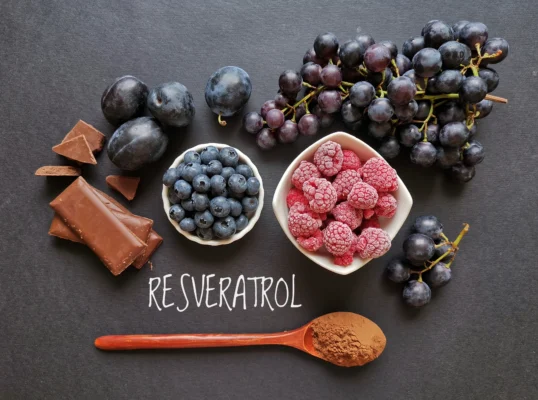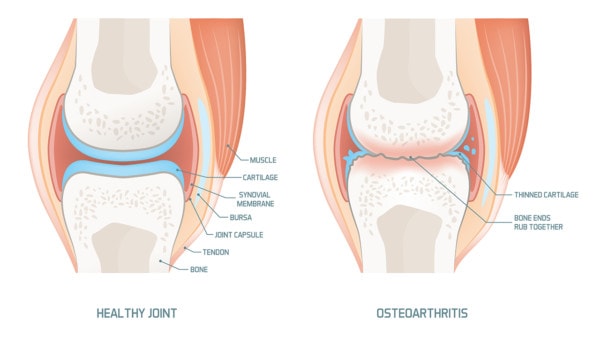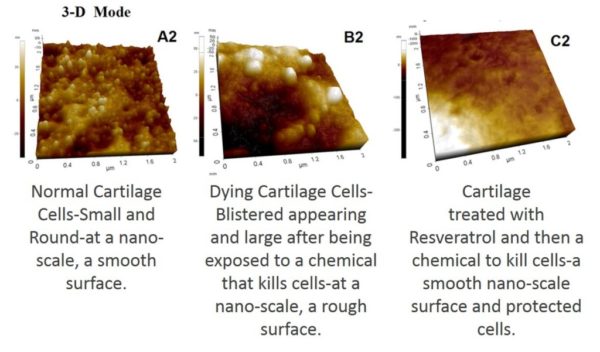Need a Supplement for Cartilage Protection and Support? Make Sure It Has Resveratrol
If you are taking a stem cell supplement for cartilage protection or arthritis, it’s a good idea to make sure it contains high-quality Resveratrol. Why? A number of studies suggest that Resveratrol protects cartilage cells, and cartilage loss or damage leads to arthritis. A good stem cell supplement with Resveratrol is designed for people who have joint pain and are looking for a natural, nutritional supplement to help support their joint health.

Credit: Shutterstock.
What Is Resveratrol?
Resveratrol is a naturally occurring antioxidant found in red and purple grapes; red wine; peanuts; some roots, such as knotweed; and some berries, such as cranberries and blueberries. Resveratrol defends against the stress of invading bacteria and other microbials. Resveratrol has gotten quite a bit of notice lately because it seems to help people keep a healthy blood sugar, and rats fed the compound live longer than their peers. Other benefits of Resveratrol studies seem to support include some protections from high blood pressure, heart failure, heart disease, and skin cancer and support for the nerves and brain.
Resveratrol has become famous for activating the SIRT-1 gene (see this study and this study), which is associated with the beneficial effects of fasting. You may have never heard about the SIRT-1 gene, but you’ve likely seen stories about primate life extension.
In addition, since Resveratrol is found in red-grape skins, many scientists have proposed it could be the reason our red-wine drinking cousins, the French, seem to live longer than we Coke-drinking Americans. SIRT-1 is also activated by the Resveratrol in red wine, which may explain why people who drink red wine seem to live longer and have less heart disease.
Research also shows this SIRT-1 gene has a healthy impact on our cartilage.
Resveratrol in the Diet May Not Be Enough
While you may get some Resveratrol through foods you consume, it’s nearly impossible to get the amount you would need in order to mine its health benefits to cartilage through food alone, especially if you’ve already experienced some cartilage loss or damage. It’s not unlike a climber summiting Mt. Everest. A wise climber knows the air at that high altitude isn’t the norm anymore—it won’t be sufficient. The climber will need to supplement by breathing high-pressured oxygen through masks to keep his or her body healthy and functioning appropriately.
When you’ve already experienced some cartilage loss or damage, or even if you just have many years of wear and tear, it’s not the norm anymore, and it’s time to make wise choices to keep your body healthy and functioning appropriately. One of those wise choices, based on the published science to date, is to make sure your stem cell supplement contains Resveratrol.
What Is Cartilage, and How Do I Keep It Healthy?

Elenabsl/Shutterstock
Cartilage is a firm, flexible cushion for a joint that covers both ends of the bone and provides a smooth surface with little friction. It helps our joints move easily and comfortably. When you lose or damage cartilage from a joint like the knee, this is one definition of arthritis.
What can you do if you want to improve your cartilage or keep your cartilage healthy ? After reading many research studies in this area, if you have healthy cartilage, I believe moderate exercise will keep it healthy—healthier than no exercise. If you have bad cartilage or an injury, then moderate exercise may or may not help. In that case, biologic treatments like stem cells or platelets may help. While a supplement with resveratrol is important for cartilage health and stem cell support, supplements such as glucosamine and chondroitin may also be something to consider, as many objective MRI studies do show that for patients with cartilage concerns, certain supplements help to maintain cartilage health.
How Does Resveratrol Work as a Supplement for Cartilage Protection?
One study shows the SIRT-1 receptor is expressed on cartilage cells to keep them healthy. As we age, the SIRT-1 gene gets stimulated less and less, which then results in the cartilage cells becoming less stable, prompting them to produce less of the chemicals that help to absorb pressure, likely leading to osteoarthritis. What’s also fascinating is that the SIRT-1 gene activation is also lessened by diabetes and insulin signaling, so diabetics and patients with syndrome X, or metabolic syndrome, have shorter life spans and more knee arthritis. This is why it is so important that we continue to stimulate our SIRT-1 gene as we age by getting enough resveratrol to benefit our cartilage.
Another study used some fancy tools to measure the properties of cartilage at the “nano-level”, including atomic force microscopy (ATM). This tool can not only image things at a nanometer scale (like a tiny cell) in 3D, but it can also apply tiny forces as if you were pushing on the cells to make sure they were still pliable. In the study you will see images of a normal cartilage cell, a dying cartilage cell exposed to toxic chemicals, and a Resveratrol-treated cartilage cell exposed to the same toxic chemicals.

3-D mode images source: Jin H, Liang Q, Chen T, Wang X. Resveratrol protects chondrocytes from apoptosis via altering the ultrastructural and biomechanical properties: an AFM study. PLoS One. 2014;9(3):e91611. Published 2014 Mar 14. doi:10.1371/journal.pone.0091611
The results? Normal cartilage cells are small, tight, and round, and at a nanoscale, this translates to a smooth surface. Dying cartilage cells exposed to cell-killing toxic chemicals appear large and blistered, and at a nanoscale, this translates to a rough surface. Resveratrol-treated cartilage cells exposed to the same cell-killing toxic chemicals have a smooth surface, calm and flat like a still lake; this translates to cartilage cells protected from the chemicals. Resveratrol also protected the outer covering of the cells (cell membranes), the cell elasticity, and the cell skeleton.
Stem Cell Supplement with Resveratrol
Since we know resveratrol activates the SIRT-1 gene, getting enough Resveratrol as we age is imperative to providing those necessary health benefits to our cartilage. Adding a good high-quality stem cell supplement with resveratrol is a good way to meet these needs.
To create the our stem cell support formula, we tested many different supplements in the lab against human stem cells, and Resveratrol performed very well, so we included it our proprietary formula. Research continues to support that the compound helps cartilage cells, a constant issue for patients with arthritis.
The upshot? Since a number of studies have shown that Resveratrol is a effective supplement for cartilage protection, we recommend it to our patients with arthritis. In addition, we were so impressed with its stem cell support function in our own lab tests that we included a high-quality resveratrol in our Regenexx Advanced Stem Cell Support Formula. So if you have arthritis or are in the early stages of it, or even if you just have many years of wear and tear and want to start protecting your cartilage, you’re no longer functioning in the norm, and it’s time to make that wise choice. You may want to consider a stem cell supplement with high-quality Resveratrol!

If you have questions or comments about this blog post, please email us at [email protected]
NOTE: This blog post provides general information to help the reader better understand regenerative medicine, musculoskeletal health, and related subjects. All content provided in this blog, website, or any linked materials, including text, graphics, images, patient profiles, outcomes, and information, are not intended and should not be considered or used as a substitute for medical advice, diagnosis, or treatment. Please always consult with a professional and certified healthcare provider to discuss if a treatment is right for you.
